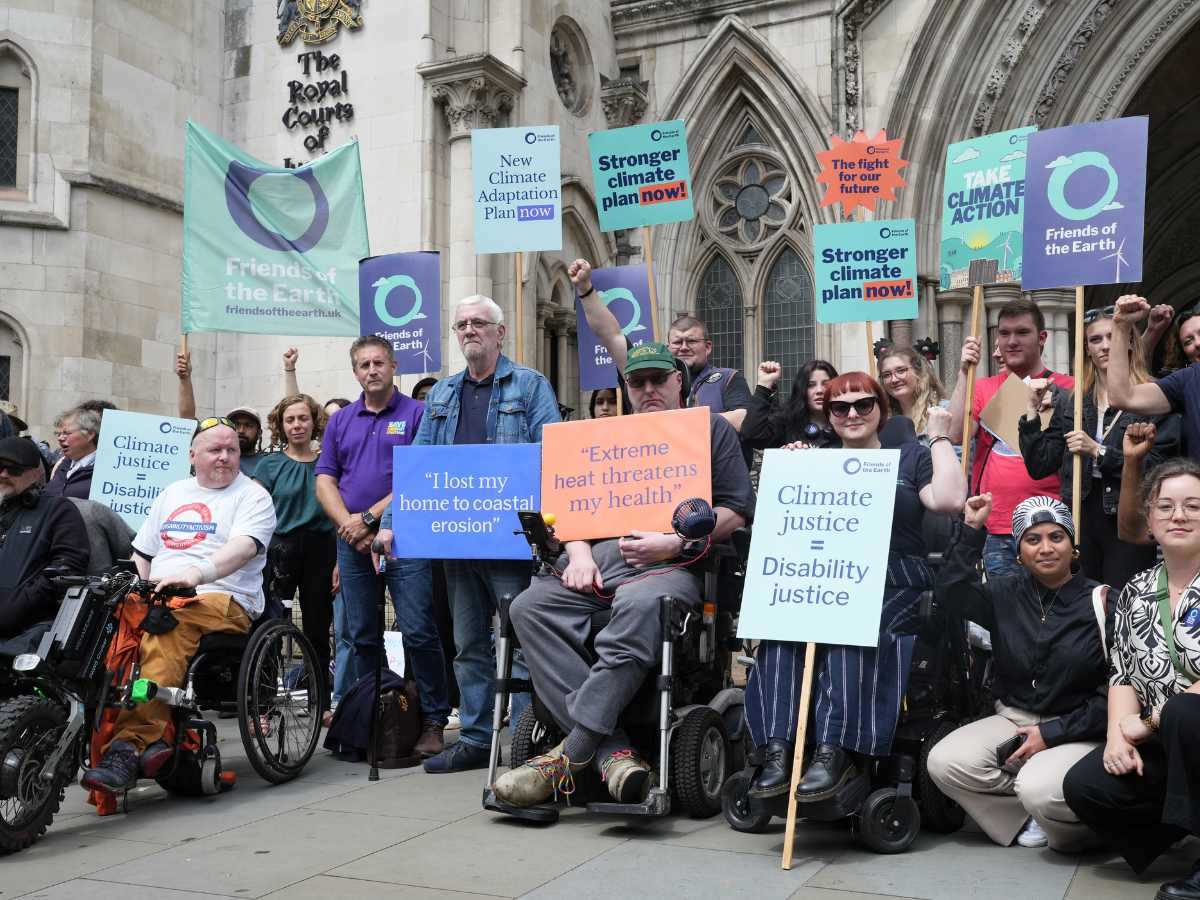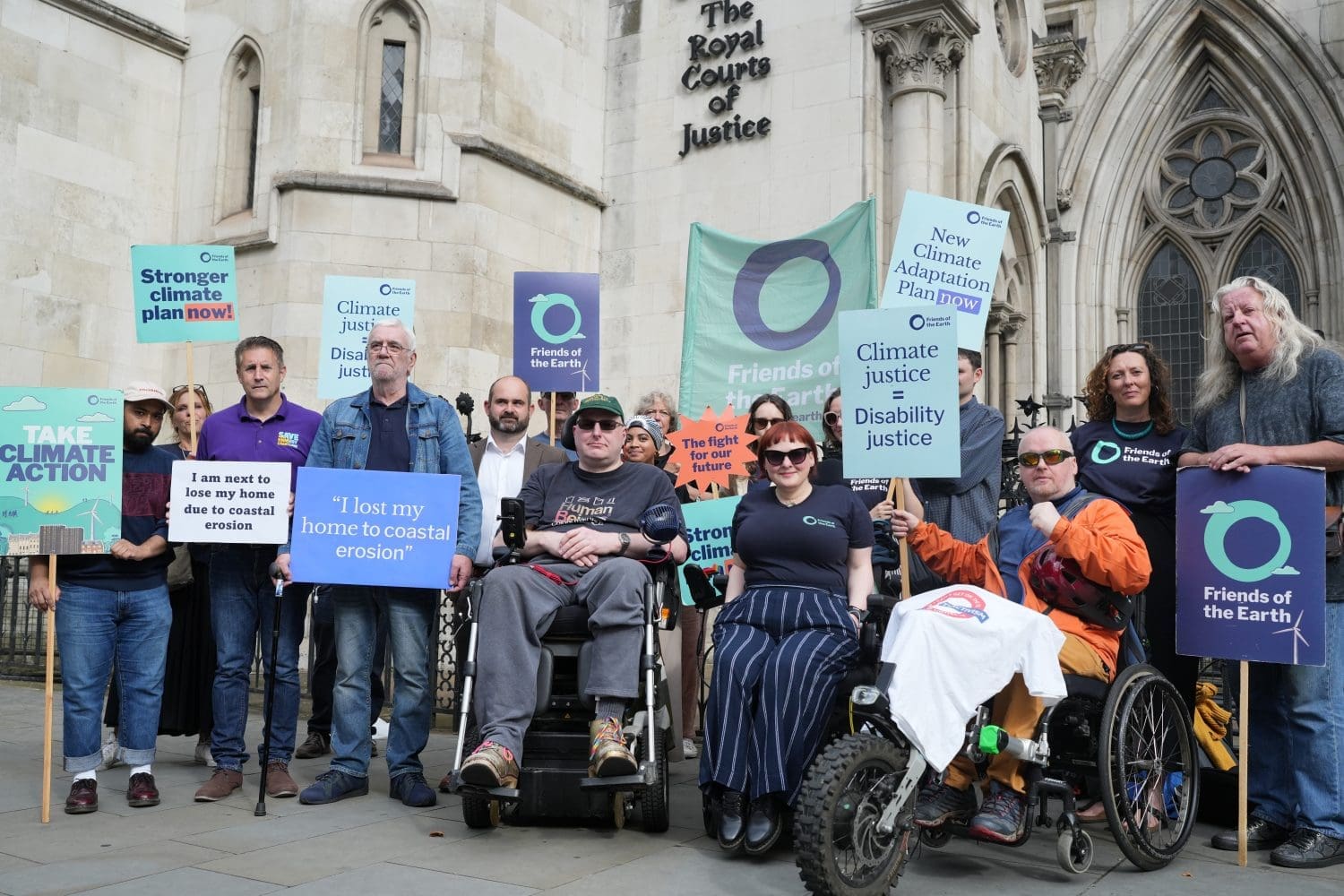A legal challenge over the UK government’s failure to protect disabled people, property and infrastructure from the foreseeable impacts of the accelerating climate crisis was heard in the High Court this week.
The groundbreaking, two-day ‘rolled up’ hearing (23-24 July) was brought by Friends of the Earth and two people whose lives are already severely impacted by the climate crisis. Supporters and allies joined them outside the High Court:
Disabled and other marginalised people not protected
Disability activist Doug Paulley has a number of health conditions which are being exacerbated by searing summer temperatures, causing not just great distress and discomfort, but also putting him at increased risk of serious harm. These include an impairment that affects the nervous system (autonomic dysfunction) which has contributed to several strokes during Doug’s life, as well as diabetes and a heart condition.
Kevin Jordan, who is also disabled, was made homeless shortly before Christmas 2023, after his house in Hemsby, Norfolk was demolished after coastal erosion fuelled by sea level rise and severe storms caused by climate change put it in acute severe danger of falling into the sea.
Friends of the Earth and the co-claimants argue that the current National Adaptation Programme (NAP3) continues to fall short and is unlawful on the grounds that it breaches the Climate Change Act for failing to set out lawful ‘adaptation objectives’, and for failing to consider and publish an assessment of the risks to delivery of the plans and policies included.
They will also argue that it breaches the human rights of the individual claimants, and that marginalised groups – such as older and disabled people – and those living in areas most at risk from climate change, are disproportionately affected by the impacts of the climate crisis and the government’s failure to produce a credible or lawful plan to help protect them. The government also should also have properly assessed equality impacts of its adaptation plans and did not do so.
Third National Adaptation Programme
Under the Climate Change Act 2008, the government of the day is required to produce and implement a National Adaptation Programme every five years, with the latest (NAP3) published in July 2023.
The programme is required to set out the government’s climate adaptation objectives, along with its plans and policies for meeting them, to protect communities in the UK from the impacts of climate change, such as extreme heat, flooding and coastal erosion. Friends of the Earth argues the objectives were set unlawfully, in breach of the Climate Change Act and Human Rights Act requirements.
Last week, the Climate Change Committee called on ministers to ‘strengthen’ the NAP, having previously warned [8] that the current programme “falls far short of what is required. Evidence of the UK’s inadequate response to worsening climate impacts continues to mount”.
Worryingly, it also highlighted that “only around 40% of the short-term actions to address urgent risks identified in the last Climate Change Risk Assessment are progressed”.
ECHR case
In April this year, the European Court of Human Rights ruled in favour of a group of older Swiss women, who argued that the lack of action on climate change had violated their human rights.
The ECHR case has relevance to this legal challenge – which will be heard by a UK court – not least because it also deals with deficient state action on climate and its adverse impact on health and human rights.
Earlier this year Friends of the Earth – along with ClientEarth and Good Law Project – successfully challenged the government’s plan for meeting the UK’s emission reduction target, the Carbon Budget Delivery Programme. The High Court has ordered that a revised plan be drawn up by 2 May 2025 at the latest.
New climate adaptation plan required
In its recent manifesto, the new Labour government pledged to “improve resilience and preparation across central government, local authorities, local communities, and emergency services.”
Friends of the Earth is calling on the government to commit to introducing a robust and comprehensive NAP, aligning with Climate Change Committee advice. The environmental justice organisation echoes the committee’s call [8] for urgent government action in three key areas:
- Governance: The government must make adaptation a top priority and ensure effective cross-government collaboration to ensure all departments are engaged with adaptation and recognise the challenges climate impacts pose across multiple sectors.
- Investment: Adaptation funding must be increased to deal with the climate challenge we face. The CCC warns “NAP3 does not tackle effectively the barriers to investment, such as low perceived urgency of adaptation, lack of clear targets and the limited understanding of adaptation actions”.
- Monitoring: Better monitoring and data collection is crucial for responding to the impacts of climate change. Progress must be capable of being effectively tracked. Without better information people cannot assess the risks they are exposed to, and parliament cannot hold the government to account.
Last week (Friday 19 July) Friends of the Earth published new analysis showing that millions of lives are threatened by extreme heat in England due to the UK’s lack of climate preparations.
Climate adaptation plans putting lives at risk
Friends of the Earth climate campaigner, Alison Dilworth, said:
Our homes, lives and livelihoods are being put at risk by the government’s weak, and we believe unlawful, climate adaptation plans.
The failure to make the nation more resilient to the floods, storms and heatwaves that are increasingly battering Britain is already affecting millions of people across the country – with older and disabled people among those most at risk.
Labour must deliver on its pre-election pledge to improve resilience and preparation by urgently drawing up a much tougher climate adaptation programme to prepare the UK for the enormous challenges of a dangerously warming planet, with those most affected involved in its planning.
Kevin Jordan, said:
I was told my house would be safe for a century, but 14 years after moving in it had to be demolished due to the accelerating rate of coastal erosion.
The government’s adaptation plans are completely inadequate for dealing with the threat that climate change to people and the economy.
The National Adaptation Programme should be ripped up and replaced with a new plan that better protects us all from the escalating impacts of the climate crisis.
The government is not properly protecting disabled people
Doug Paulley, said:
Disabled people are disproportionately affected by the impacts of climate change, but once again they have been badly let down by an adaptation plan that completely fails to address the particular – and often severe – threats we face from extreme weather like flooding and heatwaves, and wider impacts such as power cuts during severe storms.
The lack of planning makes me fearful that in an emergency disabled people won’t be properly protected.
We urgently need a new adaptation programme that recognises the acute threat disabled people face and includes proper planning to protect them, such as mandatory care home procedures for protecting residents from flooding and extreme heatwaves.
Leigh Day solicitor Rowan Smith said:
For the first time in UK legal history, the High Court will have to determine whether the government’s policy to adapt to climate change is lawful, including as to whether our clients’ human rights have been breached. This is a truly landmark climate change case, which is likely to have far reaching implications for generations to come. We look forward to presenting our arguments as forcefully as we can at the hearing.
Featured image and additional images via Friends of the Earth





